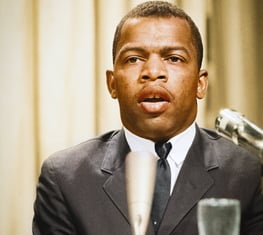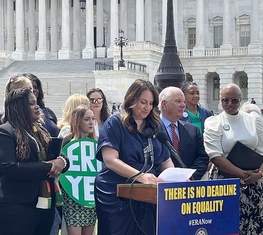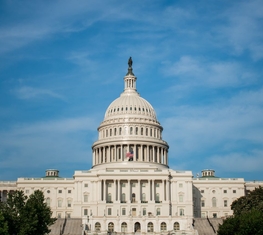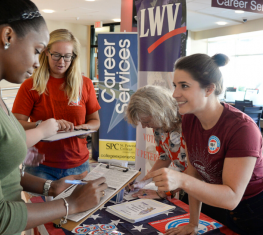Celebrating Black Women Who Helped Pave the Way for More Black Women in Politics
Last month’s historic inauguration of the first Black, South Asian, and female vice president of the United States is a milestone in American history that has long been awaited and was long overdue. Throughout her career, Kamala Harris has broken barriers and opened doors for women and girls who look like her and who don’t look like her. When she is being honored for all of her hard-won accomplishments, she always reminds us that she is honored to stand on the shoulders of many Black women who came before her, challenging that political glass ceiling. During Black History Month, we honor and celebrate the vice president not only because she is a Black and Asian woman who has overcome incredible obstacles, but because she is an accomplished American woman with leadership skills that clearly make her stand out as one of the greats in our country. We must celebrate Vice President Harris and all the women who have come before her every day of the year and not just during one month.
Now let us take this moment to reflect on some of the women whose shoulders she stands on.
Shirley Chisholm elevated the voice of black women in politics in the 1960s overcoming many dangerous obstacles and blatant racism. She Chisholm began her activism in the 1960s by working in organizations that fought for voting rights, including the League, promoting civic education, and championing civil rights. She was the first Black woman to serve in Congress and the first Black person to run for president in a major party. Seeing Kamala Harris elected vice president, I believe, would have bought her joy, fulfillment, and the urge to continue the fight.
Barbara Jordan, the first black woman elected to the Texas legislature represented the voters of Houston at the height of the civil rights movement. She was also the first Black woman elected to Congress from the deep South. Jordan had the honor of delivering the keynote address at the Democratic National Convention in 1976, where she noted that her presence, “...is one additional bit of evidence that the American dream need not forever be deferred." I believe she would have seen Vice President Harris’s election as a next step toward that dream that had been too long deferred.
The opportunity for these black women to serve as elected officials would not have been realized without the dangerous and determined work of civil rights leaders like Fannie Lou Hamer. Hamer fought to expand the vote to Black people against all odds. In 1962, Hammer organized volunteers to register Black Americans to vote in Mississippi, but they were denied registration due to unfair literacy tests. Despite losing her job for attempting to vote, Hammer took the literacy tests two more times and passed. However, another barrier was put in place, the requirement for two poll tax receipts. For every step forward there was a system working to implement new suppression tactics to prevent Black voters from exercising their constitutional right. Even then Fannie Lou Hamer wouldn’t be silenced. Two years later she co-founded the Mississippi Freedom Party and challenged the all-white Democratic delegation from Mississippi at the 1964 Democratic National Convention, delivering testimony that brought to life the real struggle Black people in the South experienced when trying to participate in elections.
There are hundreds of stories like these– stories of brave women in every state of the union who fought for their constitutional rights to participate in our elections – and those who broke barriers and became the first to seek elected office. We honor their impact and bravery to pave the way for more Black women. And we like them, want to make sure being the first does not mean being the last.
The 2020 election had the highest voter participation in American history, ushering in more people of color and more Black women into elected office than ever before. According to the Center for American Women in Politics, in the 117th Congress, 26 Black women currently serve in the U.S. House of Representatives, but there are no Black women serving in the Senate since Vice President Harris ascended to the White House. In-state legislatures around the country, more than 300 Black women were elected to statehouse offices, and of the top 100 largest cities in America, six Black women currently serve as mayors. Let us also acknowledge the many Black women who serve as are mayors and elected officials in the many communities that we don’t see on the six o’clock news. They are working hard too and making a difference.
While these numbers are a step in the right direction, as only the second Black woman elected president of the League of Women Voters in 100 years, it is clear that representation of Black women and women of color in politics and leadership roles in our country still has a long way to go. We must continue to tell the stories of Black women that will inspire the next generation of Black women to seek elected office. We must never forget our history, and the tireless work of Black women and allies to advance voting rights, push for change, and continue to shape a more equitable America. More importantly, white America must be moved to appreciate, acknowledge, and understand the contributions to our country by these women and their other colleagues of color.
Each one of us has a part to play in the long campaign for a just, equitable world. We cannot assuage our feelings of guilt or inadequate action of the past by celebrating Black History Month. As we celebrate this month and honor these Black sheroes of the voting rights movement, we must make a conscious effort to continue that celebration all year long. I look forward to the day that we will no longer need a Black history month because America will finally acknowledge that Black history IS American history.
Sign Up For Email
Keep up with the League. Receive emails to your inbox!
Donate to support our work
to empower voters and defend democracy.




